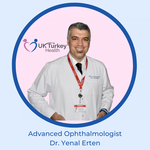






We offer various packages for our services. One of our options includes a hotel stay at the Lucky Monkey Hotel, which is a comfortable and modern accommodation for our patients. In addition, we also offer VIP ground transfer packages for a more convenient and hassle-free transportation to and from the hospital.
Alternatively, we also provide pick-up and treatment packages for those who prefer to arrange their own accommodations. It's important to note that bringing a companion along for support is allowed and we encourage patients to do so.
No matter which package you choose, rest assured that our team is dedicated to providing a comfortable and safe experience throughout the entire treatment process.
Lens replacement surgery, also known as refractive lens exchange or clear lens exchange, is a surgical procedure that involves removing the natural lens of the eye and replacing it with an artificial intraocular lens (IOL). This procedure is typically performed to correct vision problems such as nearsightedness, farsightedness, and presbyopia, as well as to treat cataracts.
The procedure is typically performed on an outpatient basis, with the patient receiving local anesthesia and sedation to minimize discomfort. The surgeon makes a small incision in the cornea and removes the natural lens, replacing it with the artificial IOL. The IOL is chosen based on the patient's individual vision needs and may be monofocal, multifocal, or accommodating.
Most patients experience significant improvement in their vision following lens replacement surgery, with many able to achieve 20/20 vision or better. Recovery time varies, but most patients can resume normal activities within a few days to a week after the procedure.
What does UK-Turkey Health offer patients?
How many specialists are there and what accreditation's have been awarded to UK-Turkey Health?
An implantable contact lens (ICL) is a special contact lens that is implanted inside the eye and works with the eye’s natural lens. Unlike regular contact lenses, ICL does not need frequent removal. It can correct a wide range of vision errors, including nearsightedness (myopia), farsightedness (hyperopia), and astigmatism. ICL is made from a material called Collamer, which is safe to stay in the eye for a long period of time.
The lens can be customized according to the patient’s eye shape and size, and it can be removed if your prescription does change over time. ICL is a possible solution for people who are not ideal to undergo LASIK or those who do not like the idea of permanently removing their corneal tissue.
The recovery time after ICL is relatively short. While your eye will be completely healed within a month or two, you should see the result within 24 hours. It is recommended that you take at least 5 to 7 days off work and avoid any vigorous activity. Your surgeon will discuss the recovery timeline in detail with you.
Despite the surgery being fairly swift, typically lasting less than half an hour for both eyes, the post-surgery phase holds significant importance for complete healing. Routine check-ups post-procedure are essential to track the healing progression and ascertain ideal outcomes. A rigorous care routine post-surgery is crucial to expedite recuperation.
Before being placed on the market, ICL was subject to extensive research and development. Today, it is an effective, safe, and highly successful procedure, with about 99% of patients who had it claimed to be satisfied with their implants.
Multiple scientific research and testimonials shared by patients accentuate the effectiveness of the Implantable Contact Lens operation, as the majority of patients reach at least 20/40 vision, which is a common legal requirement for driving. Moreover, this operation is recognized for its high safety standards, coupled with a minuscule complication rate.
However, similar to all medical interventions, the results of the Implantable Contact Lens (ICL) can fluctuate amongst different individuals. This can be due to several contributors such as the refractive error magnitude, the total eye health of the patient, and the adherence to post-operation guidelines. It is worth acknowledging that although the Implantable Contact Lens (ICL) has demonstrated significant effectiveness, it doesn’t act as a deterrent against age-oriented eye disorders such as cataracts or macular degeneration.





We offer various packages for our services. One of our options includes a hotel stay at the Lucky Monkey Hotel, which is a comfortable and modern accommodation for our patients. In addition, we also offer VIP ground transfer packages for a more convenient and hassle-free transportation to and from the hospital.
Alternatively, we also provide pick-up and treatment packages for those who prefer to arrange their own accommodations. It's important to note that bringing a companion along for support is allowed and we encourage patients to do so.
No matter which package you choose, rest assured that our team is dedicated to providing a comfortable and safe experience throughout the entire treatment process.
Lens replacement surgery, also known as refractive lens exchange or clear lens exchange, is a surgical procedure that involves removing the natural lens of the eye and replacing it with an artificial intraocular lens (IOL). This procedure is typically performed to correct vision problems such as nearsightedness, farsightedness, and presbyopia, as well as to treat cataracts.
The procedure is typically performed on an outpatient basis, with the patient receiving local anesthesia and sedation to minimize discomfort. The surgeon makes a small incision in the cornea and removes the natural lens, replacing it with the artificial IOL. The IOL is chosen based on the patient's individual vision needs and may be monofocal, multifocal, or accommodating.
Most patients experience significant improvement in their vision following lens replacement surgery, with many able to achieve 20/20 vision or better. Recovery time varies, but most patients can resume normal activities within a few days to a week after the procedure.
What does UK-Turkey Health offer patients?
How many specialists are there and what accreditation's have been awarded to UK-Turkey Health?












We offer various packages for our services. One of our options includes a hotel stay at the Lucky Monkey Hotel, which is a comfortable and modern accommodation for our patients. In addition, we also offer VIP ground transfer packages for a more convenient and hassle-free transportation to and from the hospital.
Alternatively, we also provide pick-up and treatment packages for those who prefer to arrange their own accommodations. It's important to note that bringing a companion along for support is allowed and we encourage patients to do so.
No matter which package you choose, rest assured that our team is dedicated to providing a comfortable and safe experience throughout the entire treatment process.
Lens replacement surgery, also known as refractive lens exchange or clear lens exchange, is a surgical procedure that involves removing the natural lens of the eye and replacing it with an artificial intraocular lens (IOL). This procedure is typically performed to correct vision problems such as nearsightedness, farsightedness, and presbyopia, as well as to treat cataracts.
The procedure is typically performed on an outpatient basis, with the patient receiving local anesthesia and sedation to minimize discomfort. The surgeon makes a small incision in the cornea and removes the natural lens, replacing it with the artificial IOL. The IOL is chosen based on the patient's individual vision needs and may be monofocal, multifocal, or accommodating.
Most patients experience significant improvement in their vision following lens replacement surgery, with many able to achieve 20/20 vision or better. Recovery time varies, but most patients can resume normal activities within a few days to a week after the procedure.
What does UK-Turkey Health offer patients?
How many specialists are there and what accreditation's have been awarded to UK-Turkey Health?
CONTACT SUCCESSFUL